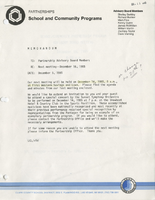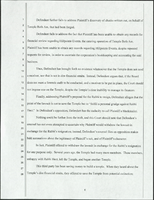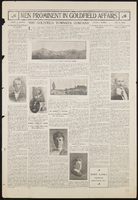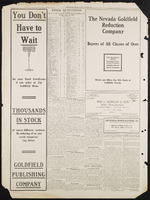Search the Special Collections and Archives Portal
Search Results

Documents related to the Clark County School District School-Business Partnership Program, 1983-1986
Date
Archival Collection
Description
These documents describe the need for the Clark County School District School-Business Partnership and a schedule for accomplishing specific activities. Mark Fine was the chairman for the partnership advisory board.
Text


Meeting minutes for Consolidated Student Senate University of Nevada, Las Vegas, Febuary 14, 1985
Date
Archival Collection
Description
Text

Gene Noboru Nakanishi oral history interview: transcript
Date
Archival Collection
Description
Oral history interview with Gene Noboru Nakanishi conducted by Ayrton Yamaguchi, Cecilia Winchell, and Stefani Evans on April 2, 2021 for Reflections: The Las Vegas Asian American and Pacific Islander Oral History Project. Gene Nakanishi shares his detailed family history from both his father's and his mother's families. He discusses his paternal grandfather's work on the Union Pacific Railroad, the family's internment in Wyoming during World War II, and his father's release from the camp by joining the United States Army Signal Corps. Nakanishi also talks of his maternal grandfather who was of the Bushido ("warrior") class in Osaka, Japan, and his grandfather's work with Christian missionaries. He shares details of his mother's restaurant employment in Los Angeles and her opening of Osaka Japanese Bistro in Las Vegas in 1969. Nakanishi also talks about being born and raised in Las Vegas, his musical schooling at Berklee College of Music in Boston, and his graduate education at Harvard University. He discusses his work as a band teacher for the Clark County School District, his involvement in the Idyllwild Arts Summer Program band camp, and his interests in jazz music.
Text

Transcript of interview with Toni Clark by Joanne Goodwin, July 2, 1996
Date
Archival Collection
Description
Toni Clark (born Lena Gaglionese) spent her youth in Seattle, Washington where she was born on April 4, 1915 to Angelene and Salvatore Gaglionese. Her father and mother moved to the Seattle area when they immigrated to the United States from Naples, Italy years earlier. Salvatore worked as a street cleaner for the city of Seattle and Angelene cared for the house and family until her early death. Toni grew up with three siblings, her father and step-mother, and an uncle and cousins next door. After attending Seattle’s Franklin High School for three years, she left. “I just didn’t like school so I quit,” she said, and spent the next couple of years at home. From these simple origins, Toni became “the first lady of Las Vegas” as some admirers called her, referring to the role she played in the transformation of Las Vegas from a frontier town into a glamorous resort town during the 1950s and 1960s. In 1941, before the Second World War began, Toni traveled to San Diego to visit friends and decided to stay. After a year of caring for a young boy, she moved into the Barbara Worth Hotel which was owned by Wilbur Clark. Clark’s father ran the hotel and suggested that Toni apply for a job at his son’s new bar and restaurant, the Monte Carlo. She had not met Wilbur Clark at the time and her shyness dissuaded her from making the move. Nevertheless, she did apply and went to work as the hostess of the Monte Carlo in downtown San Diego. Wilbur and Toni’s courtship began slowly. He gave her the name Toni, saying she “looked more like a Toni than a Lena,” and she kept it. In 1944, around the time Wilbur Clark relocated to Las Vegas where he had purchased the El Rancho Hotel, the couple married in Reno, Nevada and permanently made Las Vegas their home. Clark’s involvement in Las Vegas clubs and gambling expanded with the Monte Carlo downtown and the Player’s Club on the strip. But his dream to create a luxury resort hotel came to fruition when the Desert Inn opened in 1950. The fifth major property on the strip, the Desert Inn had several features that distinguished it from other places. The Skyroom offered a private club atmosphere for talking, music, and dancing. The Monte Carlo Room served French cuisine. The Doll House provided round-the-clock childcare for children of hotel guests. The Painted Desert Room, the property’s showroom, featured top performers and the Donn Arden Dancers. All these features combined to create a resort that offered guests an exquisite setting for a gambling vacation. Toni Clark had a special place at the heart of the Desert Inn’s social life. She brought a gracious and elegant charm to social events associated with the property. Although she said she was never involved in the business of the hotel-casino, she played a unique role setting a new tone for the enterprise. She entertained guests and dignitaries at the hotel as well as her home; organized fashion shows featuring the top designers of the time for the wives of high-rollers; and created celebrations of special events, notably her husband’s late December birthday, with annual parties. When Wilbur Clark died in 1965, Toni Clark remained active in the city’s social life. She did not disappear as others had, but continued to plan and attend social functions. As part of her service to the community, she took particular pleasure in her work with the Variety Club. She continued to reside in Las Vegas until her death in 2006.
Text
Dunes Hotel and Casino Records
Identifier
Abstract
The Dunes Hotel and Casino Records are comprised of administrative, publicity, and entertainment materials documenting the history of the Dunes Hotel and Casino in Las Vegas, Nevada from the years 1954 to 1992. Included are correspondence, contracts, photographs, hotel budgets, and an early aerial photograph of the property. The material provides a significant amount of historical documentation of the hotel that was long known to tourists and residents as the "the Miracle in the Desert."
Archival Collection
Las Vegas Art Museum Records
Identifier
Abstract
The Las Vegas Art Museum Records (1952-2009) contain administrative files, press, marketing materials, and scrapbooks that document the history of the Las Vegas Art Museum (LVAM). Collection materials include exhibition files, annual reports, financial statements, board meeting agendas and minutes, event invitations, press releases, and newspaper and magazine clippings documenting the museum's activities. Materials include photographs from museum events as well as photographs of artwork displayed as part of visiting and permanent exhibitions. Audio and video recordings include interviews with museum staff and local news coverage of events. Also included are architectural floor plans for the Sahara West Library, which was used as a gallery space for LVAM. Digital files in this collection include recordings and presentation slides from LVAM lectures with curators and artists. Other digital files include photographs from LVAM events and workings files from LVAM staff.
Archival Collection
Shelley Berkley Papers
Identifier
Abstract
The Shelley Berkley Papers (1987-2012) consist primarily of correspondence and other documents pertaining to Shelley Berkley's tenure as United States Representative for Nevada 1st congressional district. Topics include nuclear waste storage at Yucca Mountain, education, women's rights, health care, foreign affairs, veterans, economics, and homeland security. The collection also includes photographs, interviews, and awards. Shelley Berkley served as a member of Congress between 1999 and 2013.
Archival Collection


